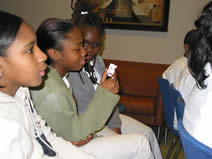Telling Your Story at UMass Boston
| On January 18th twelve scientists,ten teachers and TERC facilitators Harold McWilliams and Nick Haddad gathered at UMass Boston for the latest Telling Your Story workshop. | |
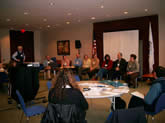 |
|
| As in previous workshops, a panel of teachers and researchers gave their thoughts on why having a researcher visit a classroom is important. | 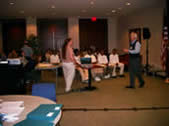 |
|
Demonstrating how to use what she learned from attending a previous Telling Your Story workshop, WHOI researcher Alison McDonald gave a presentation on ``her story’’ to a group of students from Valerie Saucer’s class at the Mildred Avenue Middle School (Boston Public Schools). |
| Using props to explain research topics is one of the many suggestions made during the workshop. Alison brought in compressed Styrofoam cups and samples of sea water taken from great depths in order to illustrate concepts of pressure and ocean currents, and gave them to the students to examine. | 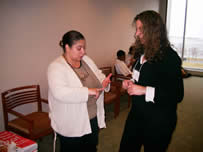 |
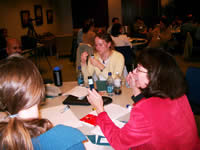 |
Valerie Saucer (Mildred Avenue Middle School) and COSEE-NE facilitator Kim Frashure celebrate the successful participation by Valerie’s students. |
| Students weren’t the only ones who got to examine ``props.’’ COSEE-NE PI and UMass Boston professor Bob Chen illustrated to workshop participants just how easy it is to demonstrate scientific concepts in a few minutes, using a few vials of colored water and a tea bag. | |
| Video producer Sharon Maurer collected feedback from students after their participation in the workshop. Sharon is producing a short documentary on the Telling Your Story process. | |
Positive Results
In an evaluation survey taken at the end of the workshop, participating researchers clearly found the experience to be valuable.
Some of the things they said the workshop offered them were:
*Great insight into what components of my research/my story would be interesting to kids and how to present [it]
*Information on what teachers need from presenters
*Knowledge that there are teachers who really think this is a good idea
*How to plan and give classroom presentations knowledge of school needs
*A better perspective on life in a classroom
*Hints for an upcoming teaching opportunity from science teachers in the classroom.
Other benefits that the researchers mentioned were:
*Great connecting with scientists and teachers
*Feel more comfortable and confident going into a classroom
*Networking was great
Hot Tips for a Successful Classroom Visit
*Plan, plan, plan
*Stop in to say hi to the school principal before meeting with the teacher
*Bring a photo of yourself as a student to show the kids
*Bring nametags for the kids to fill out
*Best time to visit is first period
*Next best time is right after study hall
*Bring materials to teacher in advance to prepare kids for your visit
*Kids’ attention spans can be shorter than you think
*Have a pre-visit planning meeting with the teacher
*Do your homework!
